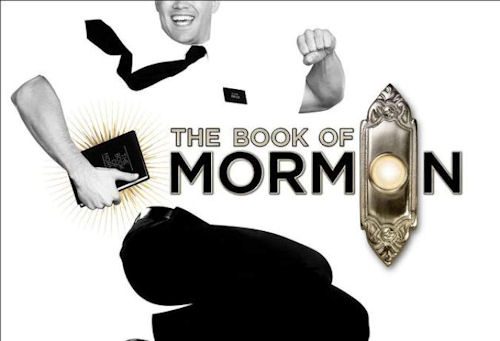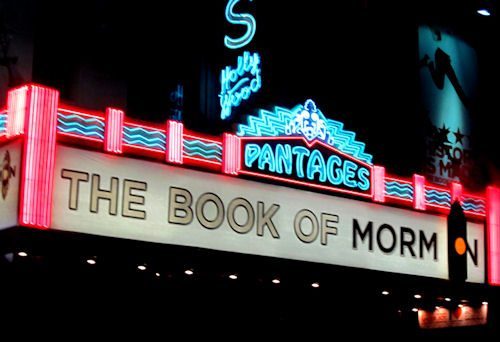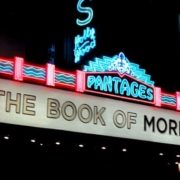THE BOOK OF ALTMAN: A REVIEW OF THE BOOK OF MORMON
The Book of Altman: A Review of The Book of Mormon
At the Pantages Theatre in Hollywood
February 5, 2014
An account written by the hand of Altman upon plates taken from the plates of Nephi;
Transcribed by RA in the annum MMXIV.
 What can a folk singer say about a Tony Award-winning Broadway musical that is still playing on the Great White Way and also in various touring productions around the country, one of which thankfully landed at the Pantages Theatre in Hollywood, where Jill and I and Paula saw it last night, thanks to my cultured friends Jan and Jerry, who gave us 3 tickets they didn’t need. I’ll tell you what I was expecting to see, based on its creators Trey Parker and Matt Stone’s smash hit TV series South Park, with music and lyrics by Robert Lopez. A foul-mouthed satire of organized religion, belittling the faith of ordinary mortals and bringing to the fore the alternative views of such famous atheists as scientist Richard Dawkins, comedian Bill Maher and the late great critic Christopher Hitchens.
What can a folk singer say about a Tony Award-winning Broadway musical that is still playing on the Great White Way and also in various touring productions around the country, one of which thankfully landed at the Pantages Theatre in Hollywood, where Jill and I and Paula saw it last night, thanks to my cultured friends Jan and Jerry, who gave us 3 tickets they didn’t need. I’ll tell you what I was expecting to see, based on its creators Trey Parker and Matt Stone’s smash hit TV series South Park, with music and lyrics by Robert Lopez. A foul-mouthed satire of organized religion, belittling the faith of ordinary mortals and bringing to the fore the alternative views of such famous atheists as scientist Richard Dawkins, comedian Bill Maher and the late great critic Christopher Hitchens.
Nothing could be further from the truth. I don’t think there was an atheist in the cast of characters that stretched from Salt Lake City to Uganda—the least preferred destination of the youthful Mormon trainees who are about to embark on their mandated two-year mission to a foreign country where they are supposed to convert the heathens.
The authors don’t waste a minute rehearsing the culture wars that preoccupy late-night talk shows on cable TV—whether to the right on Fox or the left on MSNBC. They have bigger fish to fry, and that is the role of the imagination in coming to terms with reality.
And a dark reality it is—both in the obvious sense of the skin color of the African people the young white Mormon Missionaries are suddenly plunked down in the middle of—and the daily struggle the Ugandans face trying to survive against poverty, famine, female genital mutilation and worst of all the scourge of AIDS. And this is supposed to be a musical comedy? Fasten your seatbelts, you serious fans of earnest folk singers telling you how serious the world is and must be taken, for you will be laughing out of your seats when you see and hear this cultural collision between two worlds as foreign to each other as Mars and Venus—the Mormons and the Africans. It’s a marriage made in comedy heaven for the astonishingly inventive Trey Parker, Robert Lopez & Matt Stone.
During the entire two hour and forty minute production—with a fifteen minute intermission—there was not one joke as mean-spirited as folk singer Utah Phillips’ risible one-liner: “The only place you can get virgin wool in Salt Lake City is from the sheep that could outrun the Mormons.” The Book of Mormon has a more unlikely hero, Elder Cunningham, portrayed with delicious abandon by Cody Jamison Strand: one of the two “companion Elders,” (the other is brilliant dancer and singer David Larsen as Elder Price) the 18-year-old missionaries who are supposed to never leave each other’s side, who turns out to be the chubby, needy kid who has not even read the founding document of his self-proclaimed faith, and has a reputation for lying and making up tall tales (which puts him in Utah Phillips company), so when his faith is challenged by the local natives he has nothing to fall back on—except his vividly overactive imagination.
 So what does he do? In desperation he starts making up his own “Book of Mormon,” pulling rabbits out of his hat to answer the questions and doubts he is peppered with by a young woman—Nabulungi, portrayed by the winsome Denée Benton—whose “General” –with-an-unprintable-name, portrayed by the fierce David Aron Damane—wants to mutilate her, and her brothers with AIDS who are surrounded by children they can’t feed. The young “Elder” becomes their savior by truly hearing their plight and distress and making up a religion to comfort their afflictions.
So what does he do? In desperation he starts making up his own “Book of Mormon,” pulling rabbits out of his hat to answer the questions and doubts he is peppered with by a young woman—Nabulungi, portrayed by the winsome Denée Benton—whose “General” –with-an-unprintable-name, portrayed by the fierce David Aron Damane—wants to mutilate her, and her brothers with AIDS who are surrounded by children they can’t feed. The young “Elder” becomes their savior by truly hearing their plight and distress and making up a religion to comfort their afflictions.
Only when his own Mormon Elders descend on them at the end does he also afflict the comfortable, by brandishing his sacrilegious doctrines that kept his flock enthralled from the time he told them their General would have to do something (unprintable) to a frog and leave their kids alone. It became their first commandment.
Well, I’m not going to spoil it for you, except to say I realized about half way through that certain Broadway conventions would have to be observed; where was the romance? And how would it truly upset the Mormon Elders assumptions and expectations? Suffice to say the young Mormon missionary does not wind up “doing it” with one of his own—this is decidedly a post-civil rights era production, and post Virginia’s miscegenation law being overturned by the US Supreme Court in the landmark case of Loving vs. Virginia play—it’s a black-and-white interracial love story as intense and dramatic as West Side Story—only more so because it takes place half a world away between the whitest of white America and the source material for America’s original sin.
The Book of Mormon—almost by the way—as a natural byproduct of its honest portrayal of a much more innocent pair of unsuspecting missionaries than Mark Twain famously satirized in his essay on those of his time—tells America’s story, more movingly and with more guts than I have ever seen it told on stage. It is the greatest story never told, until Parker, Stone and Lopez dared to tell it.
So do yourselves a favor: leave your guitar at home; go to one less hoot; attend one less concert, and hie thee hither to Hollywood’s magnificent old Pantages Theatre for a phenomenal theatrical experience you will never forget. It’s not every day that Broadway comes to LA, and when it does you realize why New York is the cultural capital of America and the Cape Canaveral of musical theatre. It’s a thrill to see when it does.
And if you think the Church of Jesus Christ of Latter-Day Saints disapproves of this play—satire or not—think again: they have three full-page ads in the playbill, with Mormons of both sexes and races smiling over the captions, “I’ve read the book;” “The book is always better,” and “You’ve seen the play…now read the book,” and a picture of “The Book of Mormon.” The real one—not the version this play unfolds, leaf by leaf. You’d almost think they had written the play—but perhaps their second-greatest advertisement was written by an atheist, for as Hamlet once reminded us, “There is more in Heaven and Earth, Horatio, than is dreamt of in your philosophy,” whatever that philosophy may happen to be. So yes it’s a brilliant satire, but it’s also a heartwarming tall tale that leaves people of faith standing, and not just standing, but still smiling.
https://www.youtube.com/watch?v=-NWU4Rf4Kj0
As even this atheist Jewish folk singer was, right alongside a good Christian—to join in the standing ovation.
Note: The Book of Mormon is scheduled to continue to play at The Pantages Theatre until May 11, 2014.
On Saturday, February 22 at 2:30pm at the Silver Lake Branch of the Los Angeles Public Library Ross Altman and Len Chandler present The Social History of Broadside Ballads—2411 Glendale Blvd, L.A., CA 90039; 323-913-7451; free; open to the public.
Ross Altman may be reached at greygoosemusic@aol.com













